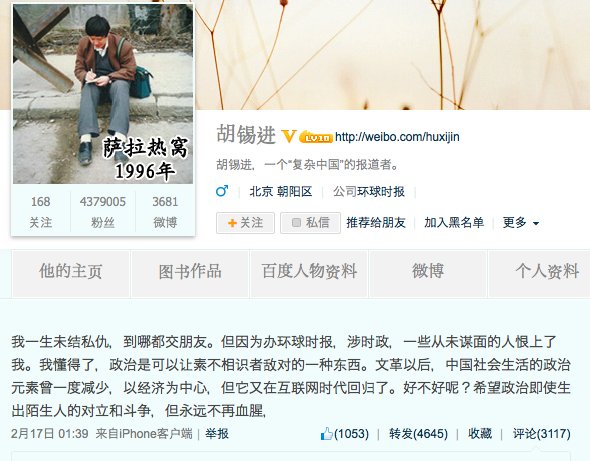Nearly three years ago, Global Times chief editor Hu Xijin opened his own Weibo account. Since then, he has been barraged with snarky retorts to his 3,000+ posts. Supporters comment with thumb’s up emoticons and “I support you” (支持), but dissenters have typically been more elaborate and biting in their replies.
Netizens have dubbed him Frisbee Hu for diligently “catching” whatever Party rhetoric is thrown at him. One of his posts last May presaged the crackdown on Weibo’s big Vs.
In one of his very first weibo, Hu took a calm stance towards his detractors. “I believe that most of my critics would not want only supporting voices alone in Weibo and that they will tolerate ‘differences’ and ‘diversity’ in Weibo” (translated by ESWN). But judging from a comment he wrote on Monday, his patience has worn thin:
胡锡进: A grudge is nothing that I know; I make friends wherever I go. But because I run the Global Times, which involves politics, there are some people I have never met that hate me. I can understand—politics is something that can provoke hostility among strangers. Since the end of the Cultural Revolution, the profile of politics within Chinese society has shrunk, as focus centered on economics. But now in the Internet Era, politics is making a comeback. So is this good or bad? Even though politics has the ability to provoke opposition and struggle, it is my hope that it will never again result in bloodshed. [Source]
我一生未结私仇,到哪都交朋友。但因为办环球时报,涉时政,一些从未谋面的人恨上了我。我懂得了,政治是可以让素不相识者敌对的一种东西。文革以后,中国社会生活的政治元素曾一度减少,以经济为中心,但它又在互联网时代回归了。好不好呢?希望政治即使生出陌生人的对立和斗争,但永远不再血腥。
The commenters went right for him:
平壤热线: Frisbee Hu, what happened to you? Smell something in the wind again?
胡飞盘,你怎么了?又嗅出什么风声了?
窝窝313: Take that disc out of your mouth. Can please we drop the innocence act? If you’re going to be the running dog of an authoritarian regime, don’t be afraid of everyone cursing you.
叼盘子的,咱能不装得这么可怜楚楚的吗?既然甘做专制政权的走狗,就别怕大家骂你
迷蜜密: Oh piss off, blogger man. You say one thing and do another. Could it be that you’re saying this now to give yourself an escape route later?
博主你大爷的,做一套说一套。现在说这个是为将来留后路吗?
黄章晋ster: While he ignores how Global Times adds insult to injury, in the future, Teacher Hu can excuse his crimes by saying that he was just carrying out his duty. Compared to Sima Nan, it would be very easy for him to make an about-face.
虽然环球落井下石的事一样不拉,但将来胡老师可以将之解释为不得已的职务犯罪,转起身来,比起司马南要容易得
Sima Nan, a leftist political commentator, famously said on Weibo that “America is the enemy of all the people in the world,” only to find himself depending on the kindness of Americans days after writing the post.
大头2000: Inciting nationalism and populism, smearing dissidents—that’s not political? That’s not bloody?
煽动民族民粹情绪,抹黑异见分子,不算政治,不算血腥?
xqmxqm: What about a tank crushing someone—is that bloody?
坦克压人血腥不
天天向下008: Is there such a thing and politics that is not bloody? Was there no blood on 6.4, 89?
还有不血腥的政治?6.4,89没有血?
包蓓蓓: Politics has always been bloody. Sometimes you see the blood; sometimes it hemorrhages, and you see nothing. Politics has always existed like the air around us. It’s just that now the Internet has provided a virtual forum through which more people are openly voicing their opinions. As for spawning opposition and struggle between strangers, the situation can rather be better explained as the Internet encouraging the expression of different opinions. Average folks who take part in normal political discussion will never be the ones who bring about or decide to enact truly bloody violence.
政治从来就是血腥的,有时是见血,有时不见血、但是内出血。政治从来都像空气一样存在,只不过是在互联网提供的虚拟民意广场上更多人公开谈论了。与其说催生了陌生人的对立和斗争,毋宁说激发不同意见的表达。至于真正的血腥,不是普通参与政治讨论的百姓能带来或者决定的。
Read more translations of comments on Hu Xijin’s weibo.
Via CDT Chinese. Translation by Little Bluegill.








